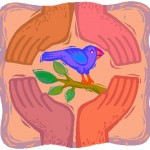Monday, Apr 26, 2010 This week’s Food for Thought – April 26, 2010
TRUST
Don’t waste your life for that which is going to be taken away. Trust life. If you trust, only then can you drop your knowledge, only then can you put your mind aside. And with trust, something immense opens up. Then this life is no longer ordinary life, it becomes full of God, overflowing. When the heart is innocent and the walls have disappeared, you are bridged with infinity. And you are not deceived; there is nothing that can be taken away from you. That which can be taken away from you is not worth keeping, and that which cannot be taken away from you, why should one be afraid of its being taken away? – It cannot be taken away, there is no possibility. You cannot lose your real treasure. —Osho
Monday, Apr 19, 2010 This week’s Food for Thought – April 19, 2010
—His Holiness the Dalai Lama, Ethics For The New Millennium
If we retain our peace of mind and thereby our happiness, it follows that, alongside a more rational and disinterested approach to our negative thoughts and emotions, we must cultivate a strong habit of restraint in response to them. Negative thoughts and emotions are what cause us to act unethically.
Furthermore, because afflictive emotion is also the source of our own internal suffering—in that it is the basis of frustration, confusion, insecurity, anxiety, and the very loss of self-respect which undermines our sense of confidence—failure to do so means that we will remain in a state of perpetual mental and emotional discomfort. Inner peace will be impossible. In place of happiness there will be insecurity. Anxiety and depression will never be far away.
![]() At times our own light goes out and is rekindled by a spark from another person. Each of us has cause to think with deep gratitude of those who have lighted the flame within us. — Albert Schweitzer
At times our own light goes out and is rekindled by a spark from another person. Each of us has cause to think with deep gratitude of those who have lighted the flame within us. — Albert Schweitzer
Monday, Apr 12, 2010 This week’s Food for Thought – April 12, 2010
Do not believe a thing simply because it has been said.
Do not put your faith in traditions only because
They have been honored by many generations.
Do not believe a thing because the general opinion believes
It to be true or because it has been said repeatedly.
Do not believe a thing because of the single witness
Of one of the sages of antiquity.
Do not believe a thing because the probabilities are in its favor,
Or because you are in the habit of believing it to be true.
Do not believe in that which comes to your imagination,
Thinking that it must be the revelation of a superior Being.
Believe nothing that binds you to the sole
Authority of your masters or priests.
That which you have tried yourself, which you have experienced,
Which you have recognized as true,
And which will be beneficial to you and to others;
Believe that, and shape your conduct to it.
—Buddha
Monday, Apr 05, 2010 This week’s Food for Thought – April 5, 2010
 The world as a whole has forgotten the real meaning of the word love. Love has been so abused and crucified by man that very few people know what true love is. Just as oil is present in every part of the olive, so love permeates every part of creation. But to define love is very difficult, for the same reason that words cannot fully describe the flavor of an orange. You have to taste the fruit to know its flavor. So with love. All of you have tasted love in some form in your hearts; therefore, you know a little about what it is. But you have not understood how to develop love, how to purify and expand it into divine love. A spark of this divine love exists in most hearts in the beginning of life, but is usually lost, because man does not know how to cultivate it.
The world as a whole has forgotten the real meaning of the word love. Love has been so abused and crucified by man that very few people know what true love is. Just as oil is present in every part of the olive, so love permeates every part of creation. But to define love is very difficult, for the same reason that words cannot fully describe the flavor of an orange. You have to taste the fruit to know its flavor. So with love. All of you have tasted love in some form in your hearts; therefore, you know a little about what it is. But you have not understood how to develop love, how to purify and expand it into divine love. A spark of this divine love exists in most hearts in the beginning of life, but is usually lost, because man does not know how to cultivate it.
Many people wouldn’t think it even necessary to analyze what love is. They recognize love as the feeling they have for their relatives, friends, and others to whom they are strongly attracted. But there is much more to it than that. The only way I can describe real love to you is to tell you its effect. If you could feel even a particle of divine love, so great would be your joy—so overpowering—you could not contain it.
Think deeply about what I am telling you. The satisfaction of love is not in the feeling itself, but in the joy that feeling brings. Love gives joy. We love love because it gives us such intoxicating happiness. So love is not the ultimate; the ultimate is bliss. God is Sat-Chit-Ananda, ever-lasting, ever-conscious, ever-new bliss. We, as souls, are individualized Sat-Chit-Ananda. “From Joy we have come, in Joy we live and have our being, and in that sacred Joy we will one day melt.” (Taittitya Upanishad 3-6-1) All the divine emotions—love, compassion, courage, self-sacrifice, humility—would be meaningless without joy. Joy means exhilaration, an expression of ultimate Bliss.
Man’s experience of joy originates in the brain, in the subtle center of God consciousness that the yogis call sahasrara, or thousand-petaled lotus. Yet the actual feeling of joy is experienced not in the head, but in the heart. From the divine seat of God-consciousness in the brain, joy descends into the heart center and manifests there. That joy comes from God’s bliss—the essential and ultimate attribute of Spirit.
—Paramahansa Yogananda, The Divine Romance, October 10, 1943
LOVE OUR MOTHER April 22,2010
Monday, Mar 29, 2010 This week’s Food for Thought – March 29, 2010
 No matter what you are doing, keep the undercurrent of happiness, the secret river of joy, flowing beneath the sands of your various thoughts and the rocky soil of your hard trials. Learn to be secretly happy within your heart in spite of all circumstances, and say to yourself:
No matter what you are doing, keep the undercurrent of happiness, the secret river of joy, flowing beneath the sands of your various thoughts and the rocky soil of your hard trials. Learn to be secretly happy within your heart in spite of all circumstances, and say to yourself:
“Happiness is the greatest divine birthright—the buried treasure of my soul. Having found it at last, I shall be secretly rich beyond the dreams of kings.”
…The joyous rays of the soul can be perceived if you interiorize your attention. This can be done by using your mind to enjoy the beautiful scenery of thoughts in the invisible, intangible kingdom within you. Do not search for happiness only in beautiful clothes, clean houses, delicious dinners, and soft cushions and chairs. These can imprison your happiness behind bars of externality. Rather, in the airplane of your interior visualization, glide over the vast tracts that comprise the limitless empire of thoughts. There behold the mountain ranges of unbroken, lofty, spiritual aspirations. If you have made up your mind to find joy within yourself, sooner or later you will find it.
The nemesis of darkness must be driven away by the burning light of smiles. You must find joy in the warmth of your smiles melting away the frost of others’ gloom. Wherever you go, you should build a big fire of smiles in the souls of men.
Learn to throw the light of joy into all hearts, so that they may burn away the darkness and find the light within themselves. You should spread the fire of smiles; and those smiles should be saturated with the smile of God, which comes through right meditation. Your smile should be the laughter of the gods—the echo of the Infinite.
—Paramahansa Yogananda
Monday, Mar 15, 2010 This week’s Food for Thought – March 15, 2010
 Silence—whether called quietude, contemplation, meditation, or some other term—has been universally valued as an antidote to our noisy, chattering mind, so that deeper truths can be revealed. As author Carlos Castaneda writes, “Whenever the dialogue stops, the world collapses and extraordinary facets of ourselves surface, as though they have been kept heavily guarded by our words.” The spiritual writer Satperm advocates extending silence to thought itself: “(I)f the power to think is a remarkable gift, the power not to think is even more so.” We find the same message in the writings of Lao Tzu: “‘He who knows does not speak/He who speaks does not know.” St John of the Cross agrees: “For whereas speaking distracts, silence and work collect the thoughts and strengthen the spirit.”
Silence—whether called quietude, contemplation, meditation, or some other term—has been universally valued as an antidote to our noisy, chattering mind, so that deeper truths can be revealed. As author Carlos Castaneda writes, “Whenever the dialogue stops, the world collapses and extraordinary facets of ourselves surface, as though they have been kept heavily guarded by our words.” The spiritual writer Satperm advocates extending silence to thought itself: “(I)f the power to think is a remarkable gift, the power not to think is even more so.” We find the same message in the writings of Lao Tzu: “‘He who knows does not speak/He who speaks does not know.” St John of the Cross agrees: “For whereas speaking distracts, silence and work collect the thoughts and strengthen the spirit.”
These comments, spanning nearly three millennia, reveal the great value all mystical traditions attribute to silence. Silence of mouth and mind is one of “nothing’s” greatest paradoxes. By thinking and saying nothing, we apprehend everything. Thus, historian of religions Edward Carpenter notes:
“Of all the hard facts of science, I know of none more solid and fundamental than the fact that if you inhibit thought and persevere, you come at length to a region of consciousness below or behind thought, and different from ordinary thought in its nature and character… [It is a world in which] one’s soul is in touch with souls of all creatures. It is to be assured of an indestructible and immortal life of joy immense and inexpressible.”
Again the message is the same: If this “joy immense and inexpressible” is to be realized, we must become nothing and nobody—a state in which, as Huxley says, “…there is no separate selfhood to obscure or refract…the ‘white radiance of Eternity’…the Thing in itself can be perceived—but only by one who, in himself, is no-thing.”
—Larry Dossey, M.D., The Extraordinary Healing Power of Ordinary Things
Monday, Mar 08, 2010 This week’s Food for Thought – March 8, 2010
When a man begins to have a vision larger than his own truth,
when he realizes that it is much larger than at first seemed,
he begins to become conscious of his morals.
His perspective on life necessarily changes,
and his will take the place of his desires.
So comes about the conflict between our inferior self and our superior self,
Between our desires and our will,
between our greed for objects that appeal to our senses
And the purpose that comes from the bottom of our heart.
—Rabindranath Tagore
 TO YOUR HEALTH: HOMEMADE GINGER ALE Tired of ginger tea? Try this tasty soda recipe. The pungent heating qualities of ginger can help keep spring colds at bay. Combine 1/2 cup of freshly grated ginger, 1 cup of cane sugar, and 4 cups of water in a saucepan. Bring to a boil, then reduce and simmer for 9 minutes. Cool and strain. To serve, add about 1/3 cup of ginger syrup to a chilled glass. Top with seltzer water and garnish with lime. Adjust the proportions to taste. Serves 4—6. Refrigerate leftover syrup for later; flavor intensifies.
TO YOUR HEALTH: HOMEMADE GINGER ALE Tired of ginger tea? Try this tasty soda recipe. The pungent heating qualities of ginger can help keep spring colds at bay. Combine 1/2 cup of freshly grated ginger, 1 cup of cane sugar, and 4 cups of water in a saucepan. Bring to a boil, then reduce and simmer for 9 minutes. Cool and strain. To serve, add about 1/3 cup of ginger syrup to a chilled glass. Top with seltzer water and garnish with lime. Adjust the proportions to taste. Serves 4—6. Refrigerate leftover syrup for later; flavor intensifies.Monday, Mar 01, 2010 This week’s Food for Thought – March 1, 2010
 The Seer is nothing but the power of seeing which,
The Seer is nothing but the power of seeing which,
although pure, appears to see through the mind.
Even though the light is pure and never-changing, it appears to change because of the medium of nature. The sun’s rays appear to bend when they pass through a section of water, although they do not actually bend. A filament gives pure light but appears to be red because of the red glass that surrounds its. Likewise, we are all the same light, but we don’t look alike, act alike or think alike because of the nature of our bodies and minds. If the mind accumulates some ideas of law, we become lawyers; some knowledge of medicine, we become doctors. If we have no ideas, we are called fools. So, although the original substance is the same, we appear to be different.
Through Yogic thinking we can see the entire humanity as our own. We can embrace all without any exceptions. Even the worst sinner will be loved by us because we ourselves were once sinners. Today’s sinner is tomorrow’s saint. We will never criticize a sinner if we realize that we were once in the same boat. Instead, we can give the so-called sinner a helping hand. If a baby dirties its diaper, you take it out of the crib, clean it and put on a new diaper. You don’t criticize it. If you wish to criticize it you have no business being with that child.
So Yoga helps in every aspect of our lives, from the White House to the outhouse. It’s not something to be experienced only after sixty years of practice, but something that can benefit everyone now.
—Sri Swami Satchidananda, The Yoga Sutra of Patanjali, Book II, Verse 20
RECOMMENDED READING: The China Study: Startling Implications for Diet, Weight Loss and Long Term Health — T. Colin Campbell, PhD & Thomas M. Campbell II
Monday, Feb 22, 2010 This week’s Food for Thought – February 22, 2010
 …As we have seen, compassion is one of the principal things that make our lives meaningful. It is the source of all lasting happiness and joy. And it is the foundation of a good heart, the heart of one who acts out of a desire to help others. Through kindness, through affection, through honesty, through truth and justice toward all others we ensure our own benefit. This is not a matter for complicated theorizing. It is a matter of common sense. There is no denying that consideration of others is worthwhile. There is no denying that our happiness is inextricably bound up with the happiness of others. There is no denying that, if society suffers, we ourselves suffer. Nor is there any denying that the more our hearts and minds are afflicted with ill will, the more miserable we become. Thus we can reject everything else: religion, ideology, all received wisdom. But we cannot escape the necessity of love and compassion.
…As we have seen, compassion is one of the principal things that make our lives meaningful. It is the source of all lasting happiness and joy. And it is the foundation of a good heart, the heart of one who acts out of a desire to help others. Through kindness, through affection, through honesty, through truth and justice toward all others we ensure our own benefit. This is not a matter for complicated theorizing. It is a matter of common sense. There is no denying that consideration of others is worthwhile. There is no denying that our happiness is inextricably bound up with the happiness of others. There is no denying that, if society suffers, we ourselves suffer. Nor is there any denying that the more our hearts and minds are afflicted with ill will, the more miserable we become. Thus we can reject everything else: religion, ideology, all received wisdom. But we cannot escape the necessity of love and compassion.
This, then, is my true religion, my simple faith. In this sense, there is no need for temple or church, for mosque or synagogue, no need for complicated philosophy, doctrine, or dogma. Our own heart, our own mind, is the temple. The doctrine is compassion. Love for others and respect for their rights and dignity, no matter who or what they are: ultimately, these are all we need. So long as we practice these in our daily lives, then no matter if we are learned or unlearned, whether we believe in Buddha or God, or follow some other religion or none at all, as long as we have compassion for others and conduct ourselves with restraint out of a sense of responsibility, there is no doubt we will be happy.
May I become at all times, both now and forever
A protector for those without protection
A guide for those who have lost their way
A ship for those with oceans to cross
A bridge for those with rivers to cross
A sanctuary for those in danger
A lamp for those without light
A place of refuge for those who lack shelter
And a servant to all in need.
—Tenzin Gyatso (Buddhist Monk)
 YOU CAN HELP: Your support is crucial to continue the fight to help “downers ” (an animal too sick or injured to stand or walk on her own, ending up in a slaughterhouse and used for human consumption) by raising your voice on their behalf. They cannot speak on their own or they would! Learn more about this campaign and sign the petition to President Obama at:
YOU CAN HELP: Your support is crucial to continue the fight to help “downers ” (an animal too sick or injured to stand or walk on her own, ending up in a slaughterhouse and used for human consumption) by raising your voice on their behalf. They cannot speak on their own or they would! Learn more about this campaign and sign the petition to President Obama at:
www.farmsanctuary.org
Monday, Feb 15, 2010 This week’s Food for Thought – February 15, 2010
 Books or yoga classes often give the impression that there are prerequisites for the study of yoga. We may be told that we should not smoke, or that we should be a vegetarian, or that we should give away all our worldly goods. Such ways of behaving are admirable only if they originate within us—and they may as a result of yoga—but not if they are imposed from outside. For instance, many people who smoke give up the habit once they begin a yoga practice. As a result of their practice they no longer want to smoke; they do not give up smoking in order to practice yoga. We begin where we are and how we are, and whatever happens, happens.
Books or yoga classes often give the impression that there are prerequisites for the study of yoga. We may be told that we should not smoke, or that we should be a vegetarian, or that we should give away all our worldly goods. Such ways of behaving are admirable only if they originate within us—and they may as a result of yoga—but not if they are imposed from outside. For instance, many people who smoke give up the habit once they begin a yoga practice. As a result of their practice they no longer want to smoke; they do not give up smoking in order to practice yoga. We begin where we are and how we are, and whatever happens, happens.
When we begin studying yoga—whether by way of the asanas (postures), pranayama (breathing), meditation, or studying yoga sutras (Spiritual text)—the way in which we learn is the same. The more we progress, the more we become aware of the holistic nature of our being, realizing that we are made of body, breath, mind and more. Many people who start studying yoga by practicing asanas continue to learn more poses until the only meaning of yoga for them lies in physical exercise. We can liken this to a man who strengthens only one arm and lets the other one become weak. Similarly, there are people who intellectualize the idea of yoga; they write wonderful books and speak brilliantly about complicated ideas such as praktri and atman, but when they are writing or speaking they cannot sit erect for even a few minutes. So let us not forget, we can begin practicing yoga from any starting point, but if we are to be complete human beings we must incorporate all aspects of ourselves and do so step by step. In the Yoga Sutras, Patanjali emphasizes all aspects of human life, including our relationships with others, our behavior, our health, our breathing, and our meditation path. —TKV Desikachar, The Heart of Yoga
The breeze at dawn has secrets to tell you.
Don’t go back to sleep.
You must ask for what you really want.
Don’t go back to sleep.
People are going back and forth across the doorsill
Where the two worlds touch.
The door is round and open.
Don’t go back to sleep.
—Jalal ad-Din Rumi







